同位语从句和定语从句的区别
- 格式:pptx
- 大小:1.68 MB
- 文档页数:10
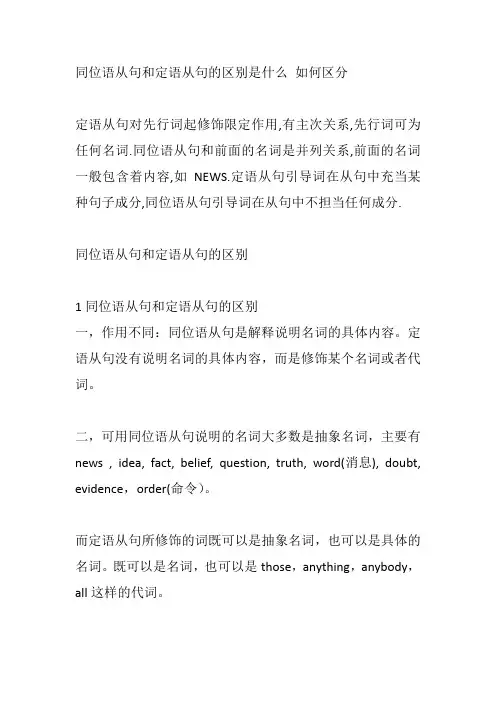
同位语从句和定语从句的区别是什么如何区分定语从句对先行词起修饰限定作用,有主次关系,先行词可为任何名词.同位语从句和前面的名词是并列关系,前面的名词一般包含着内容,如NEWS.定语从句引导词在从句中充当某种句子成分,同位语从句引导词在从句中不担当任何成分.同位语从句和定语从句的区别1同位语从句和定语从句的区别一,作用不同:同位语从句是解释说明名词的具体内容。
定语从句没有说明名词的具体内容,而是修饰某个名词或者代词。
二,可用同位语从句说明的名词大多数是抽象名词,主要有news , idea, fact, belief, question, truth, word(消息), doubt, evidence,order(命令)。
而定语从句所修饰的词既可以是抽象名词,也可以是具体的名词。
既可以是名词,也可以是those,anything,anybody,all这样的代词。
三,从句引导词不同:一般情况下,引导同位语从句的词主要是that。
当名词是question或者problem的特殊情况下,用于提问的疑问词一般都可以用在同位语从句中。
这包括:which, who, where, when, what , why等疑问词。
而定语从句中,一般情况下,that,which ,who,where ,where,why ,how等都可以引导定语从句。
2如何区分同位语从句和定语从句如果名词后的that从句是完整的,就是同位语从句;如果从句缺少主语或宾语,就是定语从句。
That从句在所有名词性从句中,都只是连接主从句的连词,没有任何意义,不在从句中充当句子成分;That从句在定语从句中是关系代词,不但连接主从句,还要指代被修饰的名词和代词(即先行词)在从句中做主语或宾语,也就是说定语从句中必定少个主语或宾语!。
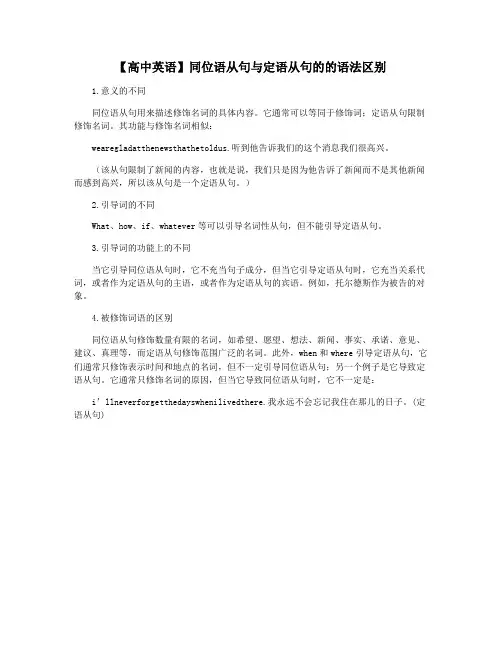
【高中英语】同位语从句与定语从句的的语法区别
1.意义的不同
同位语从句用来描述修饰名词的具体内容。
它通常可以等同于修饰词;定语从句限制修饰名词。
其功能与修饰名词相似:
wearegladatthenewsthathetoldus.听到他告诉我们的这个消息我们很高兴。
(该从句限制了新闻的内容,也就是说,我们只是因为他告诉了新闻而不是其他新闻而感到高兴,所以该从句是一个定语从句。
)
2.引导词的不同
What、how、if、whatever等可以引导名词性从句,但不能引导定语从句。
3.引导词的功能上的不同
当它引导同位语从句时,它不充当句子成分,但当它引导定语从句时,它充当关系代词,或者作为定语从句的主语,或者作为定语从句的宾语。
例如,托尔德斯作为被告的对象。
4.被修饰词语的区别
同位语从句修饰数量有限的名词,如希望、愿望、想法、新闻、事实、承诺、意见、建议、真理等,而定语从句修饰范围广泛的名词。
此外,when和where引导定语从句,它们通常只修饰表示时间和地点的名词,但不一定引导同位语从句;另一个例子是它导致定语从句。
它通常只修饰名词的原因,但当它导致同位语从句时,它不一定是:
i’llneverforgetthedayswhenilivedthere.我永远不会忘记我住在那儿的日子。
(定语从句)。
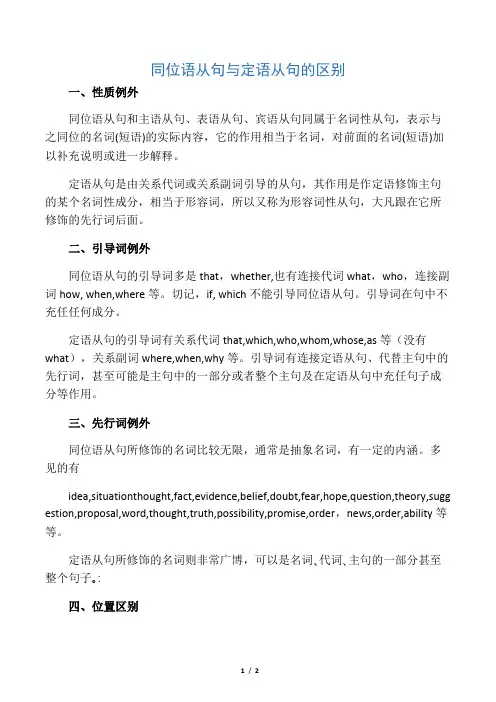
同位语从句与定语从句的区别一、性质例外同位语从句和主语从句、表语从句、宾语从句同属于名词性从句,表示与之同位的名词(短语)的实际内容,它的作用相当于名词,对前面的名词(短语)加以补充说明或进一步解释。
定语从句是由关系代词或关系副词引导的从句,其作用是作定语修饰主句的某个名词性成分,相当于形容词,所以又称为形容词性从句,大凡跟在它所修饰的先行词后面。
二、引导词例外同位语从句的引导词多是that,whether,也有连接代词what,who,连接副词how, when,where等。
切记,if, which不能引导同位语从句。
引导词在句中不充任任何成分。
定语从句的引导词有关系代词that,which,who,whom,whose,as等(没有what),关系副词where,when,why等。
引导词有连接定语从句、代替主句中的先行词,甚至可能是主句中的一部分或者整个主句及在定语从句中充任句子成分等作用。
三、先行词例外同位语从句所修饰的名词比较无限,通常是抽象名词,有一定的内涵。
多见的有idea,situationthought,fact,evidence,belief,doubt,fear,hope,question,theory,sugg estion,proposal,word,thought,truth,possibility,promise,order,news,order,ability等等。
定语从句所修饰的名词则非常广博,可以是名词、代词、主句的一部分甚至整个句子。:四、位置区别大凡情况下同位语从句跟在先行词后,用以说明该名词所表达的具体内容;有时同位语从句可以不紧跟在它所说明的名词后,而被别的词语隔开,在语法上叫做分隔式同位语从句。
定语从句大凡跟在它所修饰的先行词后面,无限定性和非限定性之分。
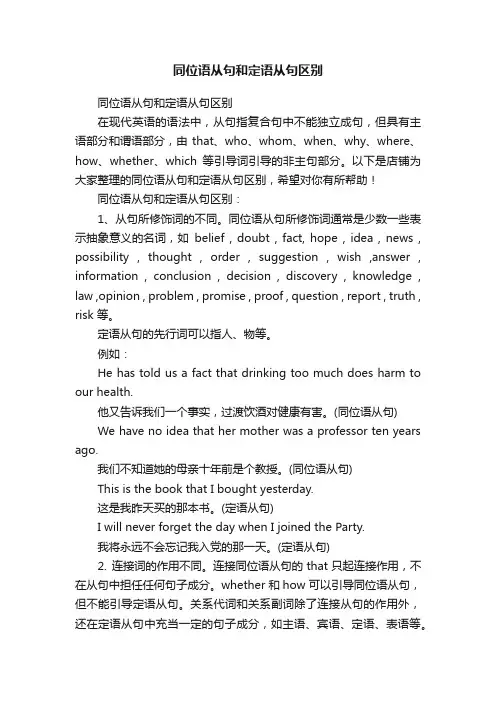
同位语从句和定语从句区别同位语从句和定语从句区别在现代英语的语法中,从句指复合句中不能独立成句,但具有主语部分和谓语部分,由that、who、whom、when、why、where、how、whether、which等引导词引导的非主句部分。
以下是店铺为大家整理的同位语从句和定语从句区别,希望对你有所帮助!同位语从句和定语从句区别:1、从句所修饰词的不同。
同位语从句所修饰词通常是少数一些表示抽象意义的名词,如belief , doubt , fact, hope , idea , news , possibility , thought , order , suggestion , wish ,answer , information , conclusion , decision , discovery , knowledge , law ,opinion , problem , promise , proof , question , report , truth , risk 等。
定语从句的先行词可以指人、物等。
例如:He has told us a fact that drinking too much does harm to our health.他又告诉我们一个事实,过渡饮酒对健康有害。
(同位语从句)We have no idea that her mother was a professor ten years ago.我们不知道她的母亲十年前是个教授。
(同位语从句)This is the book that I bought yesterday.这是我昨天买的那本书。
(定语从句)I will never forget the day when I joined the Party.我将永远不会忘记我入党的那一天。
(定语从句)2. 连接词的作用不同。
连接同位语从句的that只起连接作用,不在从句中担任任何句子成分。
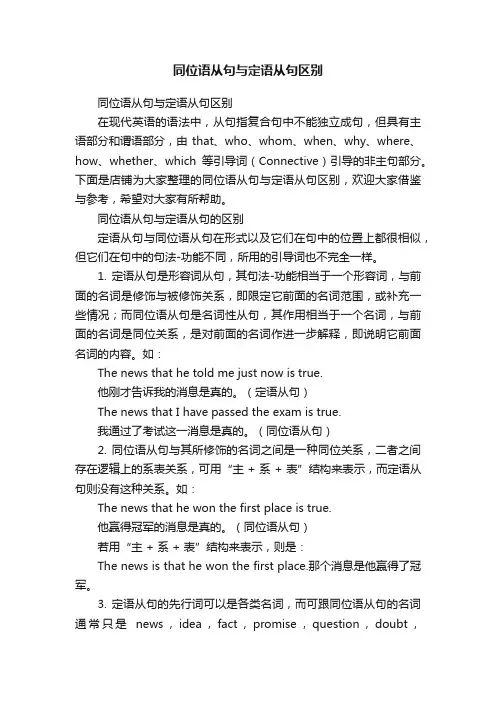
同位语从句与定语从句区别同位语从句与定语从句区别在现代英语的语法中,从句指复合句中不能独立成句,但具有主语部分和谓语部分,由that、who、whom、when、why、where、how、whether、which等引导词(Connective)引导的非主句部分。
下面是店铺为大家整理的同位语从句与定语从句区别,欢迎大家借鉴与参考,希望对大家有所帮助。
同位语从句与定语从句的区别定语从句与同位语从句在形式以及它们在句中的位置上都很相似,但它们在句中的句法-功能不同,所用的引导词也不完全一样。
1. 定语从句是形容词从句,其句法-功能相当于一个形容词,与前面的名词是修饰与被修饰关系,即限定它前面的名词范围,或补充一些情况;而同位语从句是名词性从句,其作用相当于一个名词,与前面的名词是同位关系,是对前面的名词作进一步解释,即说明它前面名词的内容。
如:The news that he told me just now is true.他刚才告诉我的消息是真的。
(定语从句)The news that I have passed the exam is true.我通过了考试这一消息是真的。
(同位语从句)2. 同位语从句与其所修饰的名词之间是一种同位关系,二者之间存在逻辑上的系表关系,可用“主 + 系 + 表”结构来表示,而定语从句则没有这种关系。
如:The news that he won the first place is true.他赢得冠军的消息是真的。
(同位语从句)若用“主 + 系 + 表”结构来表示,则是:The news is that he won the first place.那个消息是他赢得了冠军。
3. 定语从句的先行词可以是各类名词,而可跟同位语从句的名词通常只是news,idea,fact,promise,question,doubt,thought,hope,message,suggestion,possibility 等少数几个。
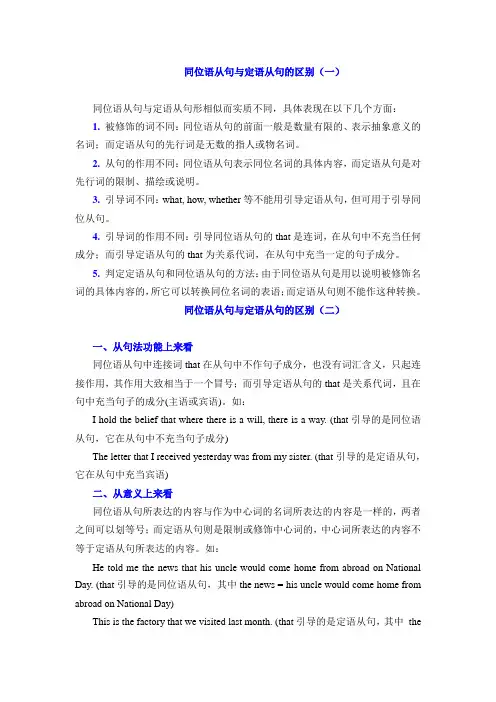
同位语从句与定语从句的区别(一)同位语从句与定语从句形相似而实质不同,具体表现在以下几个方面:1. 被修饰的词不同:同位语从句的前面一般是数量有限的、表示抽象意义的名词;而定语从句的先行词是无数的指人或物名词。
2. 从句的作用不同:同位语从句表示同位名词的具体内容,而定语从句是对先行词的限制、描绘或说明。
3. 引导词不同:what, how, whether等不能用引导定语从句,但可用于引导同位从句。
4. 引导词的作用不同:引导同位语从句的that是连词,在从句中不充当任何成分;而引导定语从句的that为关系代词,在从句中充当一定的句子成分。
5. 判定定语从句和同位语从句的方法:由于同位语从句是用以说明被修饰名词的具体内容的,所它可以转换同位名词的表语;而定语从句则不能作这种转换。
同位语从句与定语从句的区别(二)一、从句法功能上来看同位语从句中连接词that在从句中不作句子成分,也没有词汇含义,只起连接作用,其作用大致相当于一个冒号;而引导定语从句的that是关系代词,且在句中充当句子的成分(主语或宾语)。
如:I hold the belief that where there is a will, there is a way. (that引导的是同位语从句,它在从句中不充当句子成分)The letter that I received yesterday was from my sister. (that引导的是定语从句,它在从句中充当宾语)二、从意义上来看同位语从句所表达的内容与作为中心词的名词所表达的内容是一样的,两者之间可以划等号;而定语从句则是限制或修饰中心词的,中心词所表达的内容不等于定语从句所表达的内容。
如:He told me the news that his uncle would come home from abroad on National Day. (that引导的是同位语从句,其中the news = his uncle would come home from abroad on National Day)This is the factory that we visited last month. (that引导的是定语从句,其中thefactory≠we visited last month.)三、从中心名词上来看同位语从句中的中心名词常是一些表示概括意义的抽象名词,这类名词有fact, idea, view, thought, order, suggestion, news, truth, hope, promise, answer, belief, condition, doubt, fear, problem, proof, question 等。

定语从句与同位语从句的区别定语从句和同位语从句都是从句的一种类型,它们在句子中起到不同的语法作用。
本文将详细介绍定语从句和同位语从句的区别。
1. 定语从句定语从句用来修饰一个名词,并且在句子中作为这个名词的定语。
它通常用于对名词进行描述、限定或者补充说明。
定语从句的特点是:- 定语从句通常使用关系代词或关系副词引导,如that, which, who, whom, whose, when, where等。
- 定语从句紧跟在名词后面,与名词之间用逗号或者引号分隔。
- 定语从句中的谓语动词通常要有主语,这个主语就是引导词在从句中所指代的名词。
以下是一些定语从句的例子:- The book that I bought yesterday is very interesting.(我昨天买的那本书非常有趣。
)- The woman who is sitting next to me is my sister.(坐在我旁边的那个女人是我的姐姐。
)2. 同位语从句同位语从句用来说明名词,进一步解释或者补充名词的具体内容。
同位语从句通常由"是"、"为"、"包括"等引导语词引导。
同位语从句的特点是:- 同位语从句通常使用“that”引导,也可以使用“whether”或者“if”引导。
- 同位语从句与其所说明的名词之间用逗号或者引号分隔。
- 同位语从句中的谓语动词通常要有主语,这个主语就是从句中所表示的具体内容。
以下是一些同位语从句的例子:- The fact that he passed the exam made his parents proud.(他通过了考试这个事实让他的父母感到骄傲。
)- I'm not sure whether she will come to the party.(我不确定她是否会来参加派对。
)3. 虽然定语从句和同位语从句在形式上有一些相似之处,但它们在语法功能和用法上有明显的区别。
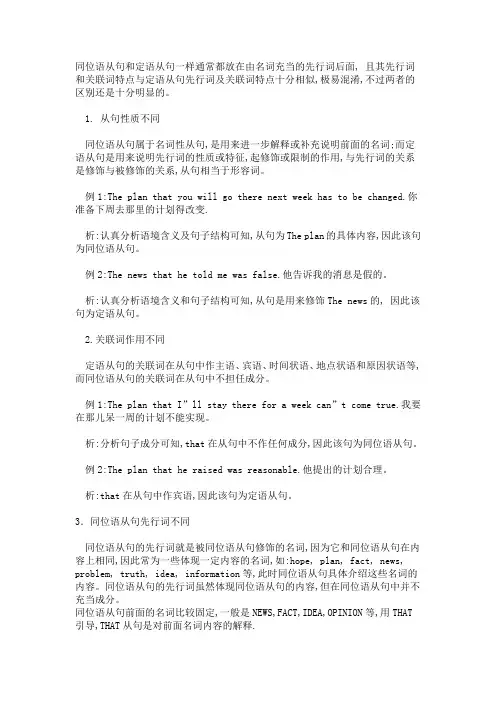
同位语从句和定语从句一样通常都放在由名词充当的先行词后面, 且其先行词和关联词特点与定语从句先行词及关联词特点十分相似,极易混淆,不过两者的区别还是十分明显的。
1. 从句性质不同同位语从句属于名词性从句,是用来进一步解释或补充说明前面的名词;而定语从句是用来说明先行词的性质或特征,起修饰或限制的作用,与先行词的关系是修饰与被修饰的关系,从句相当于形容词。
例1:The plan that you will go there next week has to be changed.你准备下周去那里的计划得改变.析:认真分析语境含义及句子结构可知,从句为The plan的具体内容,因此该句为同位语从句。
例2:The news that he told me was false.他告诉我的消息是假的。
析:认真分析语境含义和句子结构可知,从句是用来修饰The news的, 因此该句为定语从句。
2.关联词作用不同定语从句的关联词在从句中作主语、宾语、时间状语、地点状语和原因状语等,而同位语从句的关联词在从句中不担任成分。
例1:The plan tha t I”ll stay there for a week can”t come true.我要在那儿呆一周的计划不能实现。
析:分析句子成分可知,that在从句中不作任何成分,因此该句为同位语从句。
例2:The plan that he raised was reasonable.他提出的计划合理。
析:that在从句中作宾语,因此该句为定语从句。
3.同位语从句先行词不同同位语从句的先行词就是被同位语从句修饰的名词,因为它和同位语从句在内容上相同,因此常为一些体现一定内容的名词,如:hope, plan, fact, news, problem, truth, idea, information等,此时同位语从句具体介绍这些名词的内容。
同位语从句的先行词虽然体现同位语从句的内容,但在同位语从句中并不充当成分。
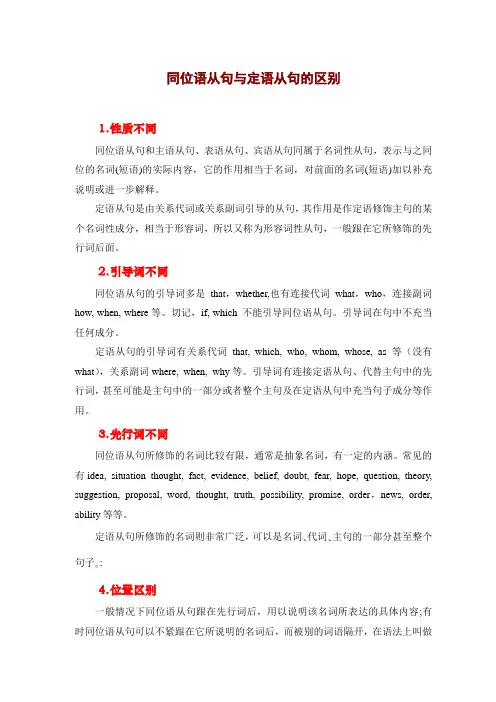
同位语从句与定语从句的区别1.性质不同同位语从句和主语从句、表语从句、宾语从句同属于名词性从句,表示与之同位的名词(短语)的实际内容,它的作用相当于名词,对前面的名词(短语)加以补充说明或进一步解释。
定语从句是由关系代词或关系副词引导的从句,其作用是作定语修饰主句的某个名词性成分,相当于形容词,所以又称为形容词性从句,一般跟在它所修饰的先行词后面。
2.引导词不同同位语从句的引导词多是that,whether,也有连接代词what,who,连接副词how, when, where等。
切记,if, which 不能引导同位语从句。
引导词在句中不充当任何成分。
定语从句的引导词有关系代词that, which, who, whom, whose, as等(没有what),关系副词where, when, why等。
引导词有连接定语从句、代替主句中的先行词,甚至可能是主句中的一部分或者整个主句及在定语从句中充当句子成分等作用。
3.先行词不同同位语从句所修饰的名词比较有限,通常是抽象名词,有一定的内涵。
常见的有idea, situation thought, fact, evidence, belief, doubt, fear, hope, question, theory, suggestion, proposal, word, thought, truth, possibility, promise, order,news, order, ability等等。
定语从句所修饰的名词则非常广泛,可以是名词、代词、主句的一部分甚至整个句子。:4.位置区别一般情况下同位语从句跟在先行词后,用以说明该名词所表达的具体内容;有时同位语从句可以不紧跟在它所说明的名词后,而被别的词语隔开,在语法上叫做分隔式同位语从句。
定语从句一般跟在它所修饰的先行词后面,有限定性和非限定性之分。
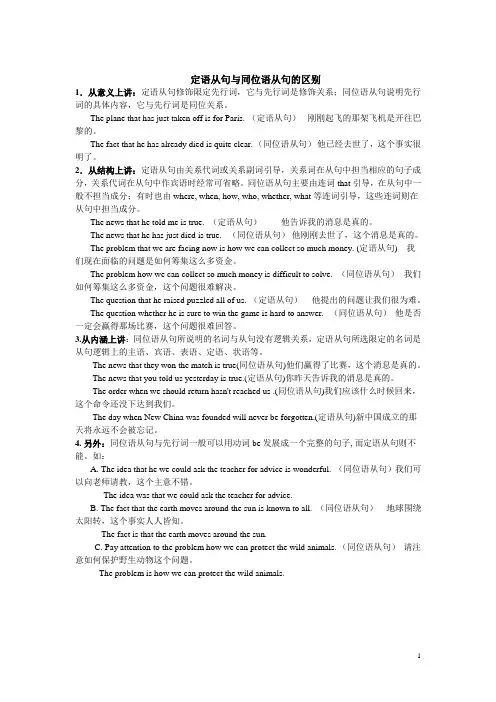
定语从句与同位语从句的区别1.从意义上讲:定语从句修饰限定先行词,它与先行词是修饰关系;同位语从句说明先行词的具体内容,它与先行词是同位关系。
The plane that has just taken off is for Paris. (定语从句)刚刚起飞的那架飞机是开往巴黎的。
The fact that he has already died is quite clear. (同位语从句)他已经去世了,这个事实很明了。
2.从结构上讲:定语从句由关系代词或关系副词引导,关系词在从句中担当相应的句子成分,关系代词在从句中作宾语时经常可省略。
同位语从句主要由连词that 引导,在从句中一般不担当成分;有时也由where, when, how, who, whether, what 等连词引导,这些连词则在从句中担当成分。
The news that he told me is true. (定语从句)他告诉我的消息是真的。
The news that he has just died is true. (同位语从句)他刚刚去世了,这个消息是真的。
The problem that we are facing now is how we can collect so much money. (定语从句) 我们现在面临的问题是如何筹集这么多资金。
The problem how we can collect so much money is difficult to solve. (同位语从句)我们如何筹集这么多资金,这个问题很难解决。
The question that he raised puzzled all of us. (定语从句)他提出的问题让我们很为难。
The question whether he is sure to win the game is hard to answer. (同位语从句)他是否一定会赢得那场比赛,这个问题很难回答。
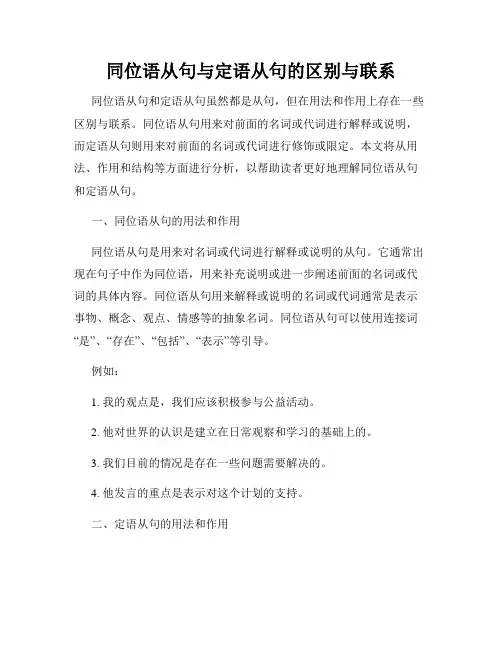
同位语从句与定语从句的区别与联系同位语从句和定语从句虽然都是从句,但在用法和作用上存在一些区别与联系。
同位语从句用来对前面的名词或代词进行解释或说明,而定语从句则用来对前面的名词或代词进行修饰或限定。
本文将从用法、作用和结构等方面进行分析,以帮助读者更好地理解同位语从句和定语从句。
一、同位语从句的用法和作用同位语从句是用来对名词或代词进行解释或说明的从句。
它通常出现在句子中作为同位语,用来补充说明或进一步阐述前面的名词或代词的具体内容。
同位语从句用来解释或说明的名词或代词通常是表示事物、概念、观点、情感等的抽象名词。
同位语从句可以使用连接词“是”、“存在”、“包括”、“表示”等引导。
例如:1. 我的观点是,我们应该积极参与公益活动。
2. 他对世界的认识是建立在日常观察和学习的基础上的。
3. 我们目前的情况是存在一些问题需要解决的。
4. 他发言的重点是表示对这个计划的支持。
二、定语从句的用法和作用定语从句是用来对名词或代词进行修饰或限定的从句。
它通常出现在句子中作为名词的后置修饰成分,用来对前面的名词或代词进行进一步说明或限定。
定语从句可以使用关系代词或关系副词引导。
例如:1. 我昨天认识了一个新同学,他来自加拿大。
2. 这是我买的那本书,你一定会喜欢的。
3. 我正在读的那本小说,讲述了一个令人动容的故事。
4. 失去父亲的那位小女孩,一直努力克服困难。
三、同位语从句与定语从句之间的区别1. 功能不同:同位语从句解释或说明名词的具体内容,而定语从句修饰或限定名词。
2. 位置不同:同位语从句通常出现在句子的主干部分,作为同位语进行解释说明;定语从句通常紧跟在被修饰的名词之后。
3. 引导词不同:同位语从句常用“是”、“存在”、“表示”等引导,定语从句则使用关系代词或关系副词引导。
4. 修饰内容不同:同位语从句解释的是名词的具体内容,定语从句则对名词进行进一步的修饰或限定。
四、同位语从句与定语从句之间的联系虽然同位语从句和定语从句在功能和位置上有所不同,但它们也存在一些联系。
定语从句与同位语从句的区别及用法解析定语从句和同位语从句是英语语法中两个常见的从句类型。
虽然它们在句子中都表达了一个附加的信息,但在用法和功能上有所区别。
本文将对定语从句和同位语从句的区别进行解析,并详细介绍它们的用法。
一、定语从句的定义和用法定语从句是用来修饰先行词的从句,它可以用来进一步描述先行词的性质、特征或者限定先行词的范围。
定语从句通常由关系代词(who, whom, whose, which, that)或关系副词(where, when, why)引导。
例如:1. This is the book that I bought yesterday.这是我昨天买的书。
2. The girl who is standing over there is my sister.那个站在那边的女孩是我的妹妹。
在这两个例句中,定语从句分别通过关系代词"that"和"who"引导,并修饰了先行词"book"和"girl"。
定语从句的引导词在从句中充当句子成分,具有主语、宾语或定语的作用。
二、同位语从句的定义和用法同位语从句是用来解释、补充或说明名词的从句,它对名词进行进一步的解释或具体化。
同位语从句通常由连词"that"引导。
例如:1. His belief is that everyone should be treated equally.他的信念是每个人应该受到平等对待。
2. The fact that he lied surprised me.他撒谎的事实让我感到惊讶。
在这两个例句中,同位语从句分别通过连词"that"引导,并对名词"belief"和"fact"进行进一步的解释。
同位语从句与先行词的关系更加密切,它通常承担某种解释或说明的功能。
如何区别定语从句与同位语从句
定语从句和同位语从句是两种不同的从句类型,可以通过以下几个方
面进行区别:
1.位置不同:定语从句通常位于被修饰名词的后面,而同位语从句通
常位于所说明的名词短语的后面。
例子:The book that I borrowed from the library is very interesting. (定语从句)
His belief that hard work pays off is admirable. (同位语从句)
2.作用不同:定语从句用于给出额外的信息来修饰或限制被修饰名词,而同位语从句用于给出同位补充说明、解释或重述被说明名词。
例子:The car that is parked outside is mine. (定语从句,修
饰名词"car")
I have no doubt that she will succeed. (同位语从句
3. 引导词不同:定语从句通常由关系词如that, which, who/whom, whose等引导,而同位语从句通常由连词如that, whether/if, how等引导。
例子:The girl who is sitting next to me is my sister. (定语
从句,引导词为"who")。
同位语从句与定语从句的用法区别同位语从句和定语从句都是从句的一种形式,用于修饰名词或代词,但它们在用法上有着一些不同之处。
同位语从句和定语从句的用法区别主要体现在以下几个方面:一、位置不同同位语从句通常置于名词或代词之后,起到对名词或代词进行解释或说明的作用。
而定语从句通常置于被修饰名词之后,用来对名词进行进一步修饰。
二、作用不同1. 同位语从句:同位语从句通常用来对名词或代词进行解释或解说,并且在句中起到同位语的作用,说明或补充名词的具体内容。
例如:- 他的目标是,他能够学好英语。
- 我知道的是,他已经离开了这个城市。
在这些例句中,同位语从句分别对名词"目标"和"我知道的"进行解释,并且与之构成同位关系。
2. 定语从句:定语从句主要是对名词进行进一步的修饰,并且在句中充当定语的角色。
例如:- 我喜欢的那本书是我的朋友推荐的。
- 坐在那里的那个人是我的老师。
在这些例句中,定语从句分别对名词"书"和"那个人"进行进一步的修饰,起到补充说明的作用。
三、引导词不同1. 同位语从句:同位语从句通常由一些引导词来引导,常见的引导词有"是"、"就是"、"意思是"等。
例如:- 他的目标是,他能够学好英语。
- 我知道的是,他已经离开了这个城市。
在这些例句中,"是"和"知道的是"就是同位语从句的引导词。
2. 定语从句:定语从句则由关系词来引导,常见的关系词有"关系代词"如"who"、"which"、"that",还有"关系副词"如"when"、"where"、"why"等。
例如:- 我喜欢的那本书是我的朋友推荐的。
同位语从句与定语从句的区别(一)一、性质不同同位语从句和主语从句、表语从句、宾语从句同属于名词性从句,表示与之同位的名词(短语)的实际内容,它的作用相当于名词,对前面的名词(短语)加以补充说明或进一步解释。
定语从句是由关系代词或关系副词引导的从句,其作用是作定语修饰主句的某个名词性成分,相当于形容词,所以又称为形容词性从句,一般跟在它所修饰的先行词后面。
二、引导词不同同位语从句的引导词多是that,whether,也有连接代词what,who,连接副词how, when, where等。
切记,if, which 不能引导同位语从句。
引导词在句中不充当任何成分。
定语从句的引导词有关系代词that, which, who, whom, whose, as等(没有what),关系副词where, when, why等。
引导词有连接定语从句、代替主句中的先行词,甚至可能是主句中的一部分或者整个主句及在定语从句中充当句子成分等作用。
三、先行词不同同位语从句所修饰的名词比较有限,通常是抽象名词,有一定的内涵。
常见的有idea, situation thought, fact, evidence, belief, doubt, fear, hope, question, theory, suggestion, proposal, word, thought, truth, possibility, promise, order,news, order, ability等等。
定语从句所修饰的名词则非常广泛,可以是名词、代词、主句的一部分甚至整个句子。:四、位置区别一般情况下同位语从句跟在先行词后,用以说明该名词所表达的具体内容;有时同位语从句可以不紧跟在它所说明的名词后,而被别的词语隔开,在语法上叫做分隔式同位语从句。
定语从句一般跟在它所修饰的先行词后面,有限定性和非限定性之分。
同位语从句与定语从句的区别(二)同位语从句和定语从句一样通常都放在由名词充当的先行词后面, 且其先行词和关联词特点与定语从句先行词及关联词特点十分相似,极易混淆,不过两者的区别还是十分明显的。
同位语从句与定语从句的区别比较同位语从句与定语从句的语法结构与功能同位语从句与定语从句的区别比较同位语从句和定语从句是英语中两种常见的从句结构,它们在语法结构和功能上有着明显的区别。
本文将对同位语从句和定语从句进行比较,并分析其语法结构与功能相关的特点。
一、同位语从句与定语从句的定义1. 同位语从句:同位语从句是位于名词后面,用来解释说明或者补充名词意义的从句。
同位语从句通常由连词“that”引导,有时也可以使用其他连词或者疑问词。
例句1:I have no doubt that he will pass the exam.(同位语从句)例句2:She is worried about whether she can get the job.(同位语从句)2. 定语从句:定语从句是用来修饰名词或代词的从句,它对先行词进行进一步说明。
定语从句通常由关系代词(如who,which,that)或者关系副词(如when,where,why)引导。
例句3:The book that you gave me is very interesting.(定语从句)例句4:I still remember the day when we first met.(定语从句)二、同位语从句与定语从句的语法结构比较1. 同位语从句的语法结构:主语 + 动词 + 同位语(从句)2. 定语从句的语法结构:先行词 + 关系代词/关系副词 + 谓语 + 其他成分三、同位语从句与定语从句的功能比较1. 同位语从句的功能:(1)同位语从句作为对名词进行解释和补充,起到进一步说明的作用。
例句5:I have a feeling that something bad is going to happen.(同位语从句)例句6:His hope is that he can study abroad next year.(同位语从句)(2)同位语从句可以用来表达说话人的观点、信念等,并引出对于主句的评价或者看法。
同位语从句与定语从句的区别有哪些同位语从句与定语从句有什幺不同呢,如何区分,小编整理了相关信息,希望会对大家有所帮助!1 同位语从句与定语从句有什幺不同1.从句表达的含义不同定语从句是从句对其先行词的修饰或限制,先行词可以是名词、代词、主句的一部分或是整个主句,属于形容词性从句的范畴;而同位语从句是对前面抽象名词进一步的说明和解释,这些词常是一些具有具体信息内容或一定内涵的名词,如idea,fact,news,hope, belief, suggestion, proposal, word, thought,doubt,truth, possibility, promise,order 等,属于名词性从句的范畴。
I made a promise that if anyone set me free I would make him very rich?我许诺如果谁让我自由,我就让他非常富有。
(同位语从句,补充说明promise 的内容)The mother made a promise which pleased all her childen妈妈许下了一个令她的所有孩子高兴的诺言。
(定语从句promise 在从句中作pleased 的主语)2.引导词及其在句子中的成分不同(1)有些引导词如how,whether,what 可以引导同位语从句,但不能引导定语从句。
The question whether we need it has not been considered.我们是否需要它这个问题还没有被考虑。
(同位语从句)I have no idea what has happened to him.。